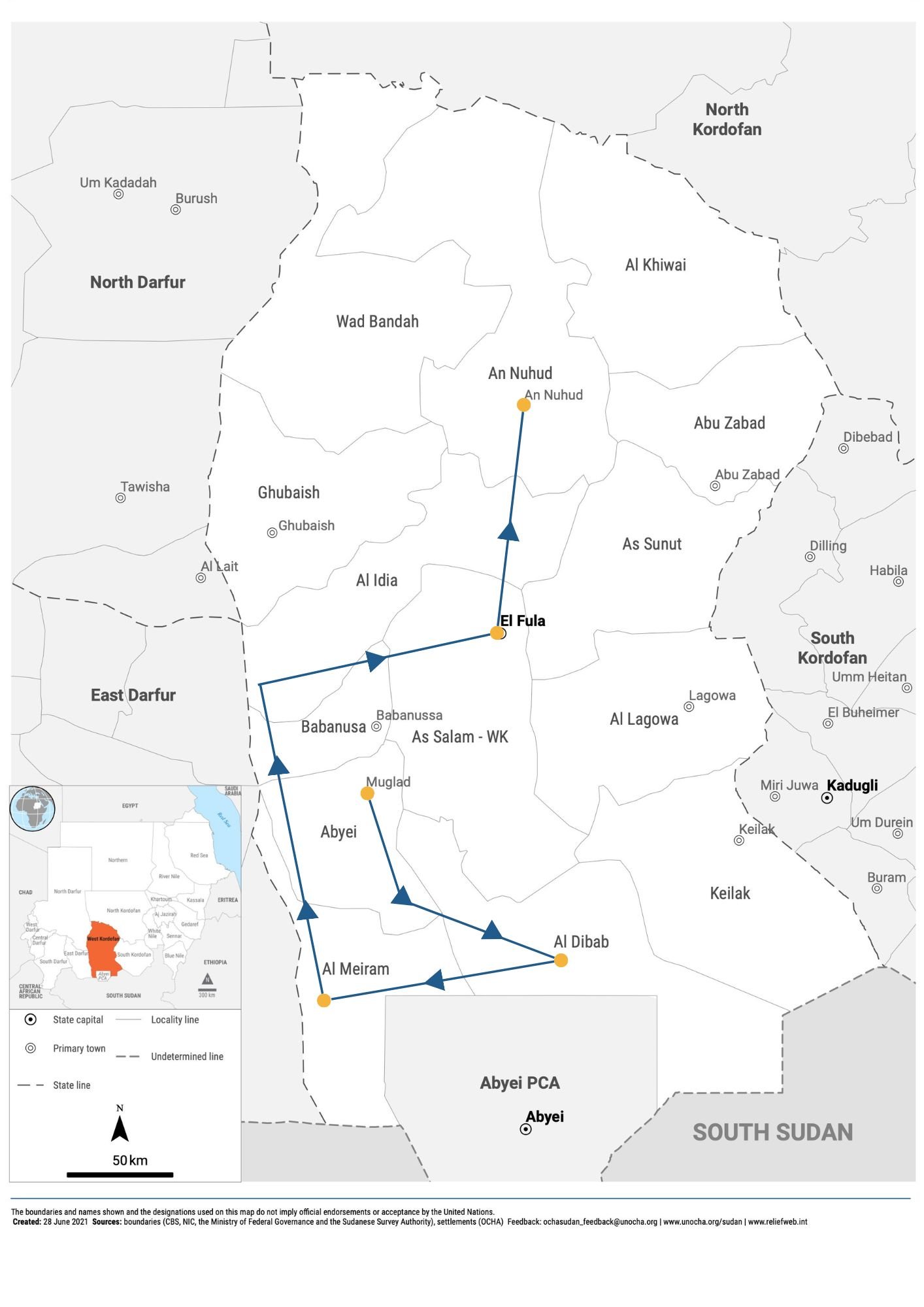Rare good news from Sudan amidst the ongoing war – building peace in West Kordofan
As the war in Sudan becomes more entrenched, many people have begun to feel powerless amid an increasingly bleak outlook. Yet the Concordis team has found that remains not only possible, but vitally important, to engage with, support, and amplify local peace initiatives in Sudan.
The Concordis team spent June and July supporting such an initiative – a peace messaging tour led by Misseriya Paramount Chief Baba Moktar across the 14 localities of the Sudanese state of West Kordofan.
Chief Moktar saw a need and an opportunity to use his influence to help inoculate this State from becoming engulfed in the war. He’s been an active party to Concordis’ peacebuilding work in Abyei for more than a decade, and he invited Concordis and the Canadian Ministry for Global Affairs to partner with him in this initiative.
The team have travelled together from town to town across the State, drawing large crowds of both women and men, many of whom made long and difficult journeys to be there. His message has been relatively simple but, to date, very influential.
He’s been urging the protagonists on both sides that, whatever their issues with one another, they must not destroy their own communities. “This is your school, that educates your children; don’t burn it. This is your clinic, that treats your families; don’t destroy it. This is your market; where you buy your food; don’t loot it.”
And he’s been telling civilians, “Whatever grievances you may have against one another, or against your neighbours, don’t use this war to get even; there are better ways to resolve your differences than fighting in this war. Don’t take sides.”
This tour has also been an opportunity for consultation and discussion, with 9 workshops to date. Through facilitated dialogue with traditional leaders, local authorities and women and men representing different communities, the team have identified recommendations for specific actions to address Sudan's ongoing conflict. These include further community meetings to advocate peace messaging and abstention from war, bespoke training on peacebuilding and conflict resolution for civil society, and calls to examine the role of traditional law and customs in de-escalating conflicts.
There were also broader recommendations, such as creating employment opportunities for youth through improved access to local markets, sponsoring sporting and cultural activities that promote peace, and providing training for women in revenue-generating activities. These comprehensive recommendations will serve as the foundation for Concordis' forthcoming initiatives in West Kordofan, building on the outreach and consultation that underpins the peace messaging tour.
This is very much in keeping with Concordis’ methodology. Even during a war, there are opportunities to:
Consult widely through existing networks, to understand the complex web of issues driving the conflict.
Work alongside local peacebuilders, recognising their expertise and offering our support when invited.
Change the incentives, creating ‘peace dividends’ – tangible benefits to living together peacefully, and increasing the cost of more destructive behaviour.
Recognise that true conflict transformation takes time and must be fully and inclusively owned and embraced by affected communities, including women and men with different ethnic, geographic and livelihood backgrounds.
Concordis’ Sudanese staff mobilised quickly and volunteered to support this work – they themselves are from the region and are eager to do all they can to prevent the war from spreading to their state, even as neighbouring states see an uptick in violence. They do so knowing the risks – it’s extremely brave to take a stand against the war, to travel when others are understandably hiding in their homes, and to brave floods and difficult roads in the rainy season.
The Canadian Ministry for Global Affairs also stepped up quickly with support for this initiative, demonstrating their characteristic nimbleness and flexibility, which is essential in responding to this rapidly evolving situation.
The next stage is to bring together traditional leaders from all 14 localities to sign a peace declaration, summarising the recommendations from the individual workshops and agreeing on a shared action plan for the future. This will form a template and messaging that can be amplified across the state and beyond.
Clearly, there are no guarantees that the war won’t spread into West Kordofan, but the tour has been a powerful testament to the transformative potential of unity, dialogue and shared aspirations. These will go a long way to building resilience to conflict. An enduring feature of the visit has been the receptiveness of local communities and leaders, who have offered locations for workshops, travel assistance for participants, and accommodation for the team.
The initiative clearly demonstrates that in Sudan right now, there are proactive local peacebuilders seeking to stop the war in their communities, and they are being met with receptive and enthusiastic local audiences. Any opportunity to support or amplify their work must be pursued in these difficult times.


